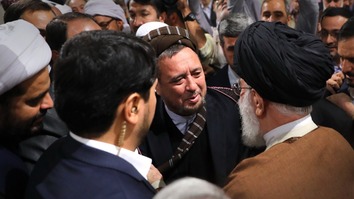For months leading up to Wednesday (July 7)'s meeting between the Taliban and the Afghan government in Tehran, the Iranian regime has been busy trying to reshape the image of the Taliban.
The meeting had a positive outcome. Both sides agreed that "war was not the solution" and to meet again to discuss a wide range of outstanding issues.
Yet while the Taliban delegation talked about prospects of peace, the reality on the ground is quite different.
On the same day of the Tehran meeting, Taliban fighters attempted to capture a provincial capital, the first time the militant group had done so since signing a peace agreement last year.
For weeks and months prior, the Taliban have been waging a relentless offensive across all of Afghanistan, displacing tens of thousands of civilians, burning homes, and looting businesses.
Tehran, which has grown closer to the Taliban in recent years and supports them with weapons, intelligence and training, has been attempting to spin the militant group's violent nature.
In a most recent example, a June 25 editorial in Kayhan, a daily whose stances are aligned with Iran's Supreme Leader Ali Khamenei, argued the Taliban "don't behead individuals anymore" as one of the reasons why the militant group is "not the group we once knew".
Hossein Shariatmadari, Kayhan's editor-in-chief and publisher, is a close confidant of Khamenei.
The editorial focused on "the change in the Taliban's tactics and behaviour", alleging that they "no longer commit crimes against the Afghan Shia population", and "are not even at odds with the Afghan Shia".
Such a view will come as a surprise to Hazaras who have long suffered persecution by the Taliban and are fighting -- with arms and through education -- to protect the gains they made after the overthrow of the Taliban in 2001.
Afghans would also point to crimes committed by the Taliban, such as the public flogging of a young woman in Herat, the group's brutal execution of a young couple in Ghor, and the rape and murder of a 16-year-old girl in Jawzjan, to name a few recent examples.
Charm offensive
Years ago, Iranian officials routinely denounced the Taliban's atrocities, describing them as barbaric, inhumane and un-Islamic.
But as it has become increasingly clear that Tehran actively supported the militant group with money, arms and training -- with the aim of undermining the Afghan government, its independence and its economic success -- this rhetoric shifted.
Just last month, Afghan military sources confirmed that members of Iran's Islamic Revolutionary Guard Corps (IRGC) have been leading the Taliban in Afghanistan's western region and providing advanced weapons -- including night vision equipment, lethal bombs and heavy weaponry -- to the militant group.
Also in June, a senior official said the commander of a seven-member Taliban cell received direct orders from the IRGC to attack and assassinate members of security forces.
During a February visit to Tehran, the Taliban delegation enjoyed an effusive welcome.
While Iranian Foreign Minister Javad Zarif personally greeted the Taliban representatives, the new-found public warmth towards them caused surprise and anguish among many in Iran and Afghanistan.
The delegation, led by Taliban deputy leader Mullah Abdul Ghani Baradar, conferred on various matters with both Zarif and Ali Shamkhani, the secretary of Iran's Supreme National Security Council.
Tehran described the visit and talks as a mediation effort, an attempt to bring the Taliban closer to the Afghan government, and a demonstration of neighbourliness toward Afghanistan.
But the reality was much different. Part of the new charm offensive was related to a practical exchange between the two sides: Iranian officials pledged their support to the Taliban in exchange for receiving water from Afghanistan.
The pro-Taliban rhetoric has seemingly seeped into some Iran's IRGC-affiliated media as well.
Following a backlash from the majority of Iranian media outlets against Kayhan's editoral, Hessam Razavi, an editorial board member of Tasnim News -- which is affiliated with the IRGC -- stated in an interview that he is "warning" that "there is no war between the Taliban and the Afghan Shia community."
Observers found the phrasing, particularly the word "warning", bizarre amid apparent efforts to purportedly convey a message of peace.

![Members of the Taliban's negotiating team are seen February 1 during a news conference in Tehran. [Fars News]](/cnmi_pf/images/2021/07/08/30632-taliban_in_tehran_-_2-585_329.jpg)






